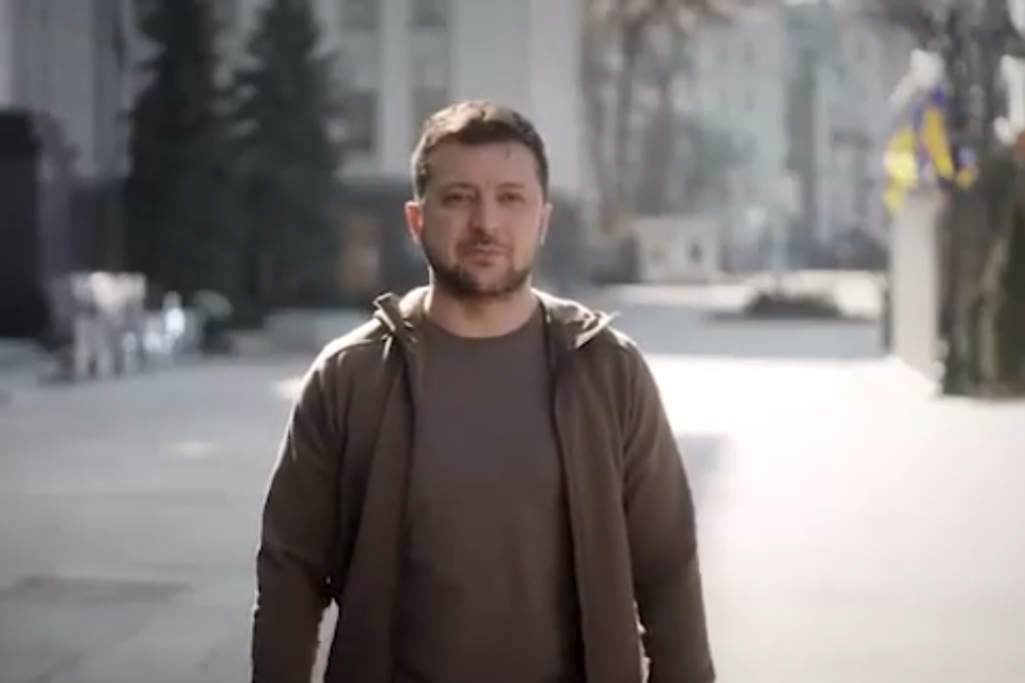
Ukrainian President Volodymyr Zelenskyy
“I need ammunition, not a ride.” Those words sound like they could have been taken right out of the script for Band of Brothers. Instead, they were supposedly spoken several weeks ago in the context of a present war by Ukrainian President Volodymyr Zelenskyy as he politely rejected an offer from the United States to evacuate him from his country ahead of Russia’s cruel and violent invasion.
Zelenskyy, a former comedy actor, was elected president of Ukraine in 2019 with 73% of the popular vote. Presenting himself as an “everyman” and rejecting the pomp that usually accompanies high office, he was elected on the promise of eliminating corruption and negotiating peace in his country’s war-torn regions. In his mid-40s with a family that includes two young children, Zelenskyy seems the least likely candidate to be leading the military defense of his overmatched nation. No one would have blamed him for taking the offer to evacuate.
C.S. Lewis and the four cardinal virtues
It’s been nearly eight decades since the last large-scale ground invasion of a sovereign European nation by another nation. As Nazi bombs fell on his native land during that worldwide conflict, a university professor by the name of C.S. Lewis, himself a veteran of the First World War, gave a series of radio broadcasts that would later become the book known today as Mere Christianity.
In a time of great uncertainty, Lewis’ voice filled the airwaves with a message of hope. In a world of violent division, Lewis offered his fellow citizens the opportunity for unity in the Gospel of Jesus Christ. With his words he sought to construct a section of solid ground to steady the wobbly feet of a war-weary people. Those talks are still widely read today.
In his presentation of “mere Christianity,” Lewis briefly treated the four cardinal virtues – character traits that “all civilized people recognize.” These virtues are prudence, temperance, justice and fortitude. In his brief treatment of fortitude, Lewis defines the virtue as “both kinds of courage – the kind that faces danger as well as the kind that ‘sticks it’ under pain.” He then writes, “You will notice, of course, that you cannot practice any of the other virtues very long without bringing this one into play.”
The importance of fortitude (courage)
It’s this last point that interests me. How does fortitude, or courage, apply to the practice of all the other virtues? Lewis doesn’t elaborate further in Mere Christianity. If you want his deeper thoughts on the subject, you must turn to The Screwtape Letters, written during that same Second World War-period, in which the senior demon Screwtape advises his nephew demon Wormwood on how best to tempt human beings.
In letter 29, Screwtape references the war and turns his demented attention to the subject of how to use war to tempt humans away from God and virtue. Here Lewis writes, from the perspective of the demon, “Courage is not simply one of the virtues, but the form of every virtue at the testing point, which means, at the point of highest reality. A chastity or honesty, or mercy, which yields to danger will be chaste or honest or merciful only on conditions. Pilate was merciful till it became risky” (Mark 15:15).
Without courage, Lewis says, you can’t have any true virtue, because courage is necessary to persevere in any virtue through trial and danger. Without courage, our mercy will fail as soon as opposition arises. Without courage, our honesty will give way to deceit as soon as the pressure mounts. Without courage, we are victims to the whims of circumstances beyond our control. One needs courage or all virtue fails.
No one knew how Zelenskyy would respond in leading his country in the face of a demented tyrant with intimidating military power at his disposal. Thus far, the leader of Ukraine has shown the world that, contrary to what we’ve seen among many global leaders recently, virtue is not dead. In Zelenskyy, the world is watching courage on display, and he deserves our full support. As we mourn for the people of Ukraine, we should rejoice in the example of virtuous fortitude on display in Zelenskyy and so many others in Ukraine.
Cultivation of virtue depends on living pictures. We need to see examples of virtue being lived so that we will have well-trod trails in the wilderness of our own experience to follow. Christian people have always understood this. We know that we can only love and learn how to love by looking to the God who is love (1 John 4:16). Christ Himself said, “This is my commandment, that you love one another as I have loved you” (John 15:12). How does Christ love us? Courageously, all the way to the cross and beyond.
Christ embodies all true virtue perfectly, including the courage that holds it all together. But in the example of Volodymyr Zelenskyy, we see an imperfect man willing to give his life for his country, and we are reminded that courageous virtue can still be found in unexpected places.
(EDITOR’S NOTE – Casey McCall is lead pastor at Ashland Avenue Baptist Church – Oldham County in La Grange, Ky.)


